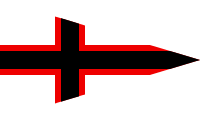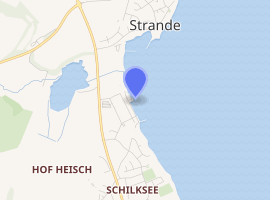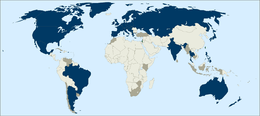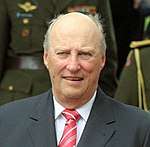Sailing at the 1972 Summer Olympics
Sailing/Yachting is an Olympic sport starting from the Games of the 1st Olympiad (1896 Olympics in Athens, Greece). With the exception of 1904 and the canceled 1916 Summer Olympics, sailing has always been included on the Olympic schedule. The Sailing program of 1972 consisted of a total of six sailing classes (disciplines). For each class seven races were scheduled from 29 August 1972 to 8 September 1972 of the coast of Kiel-Schilksee in the Bay of Kiel. Kiel hosted the Olympic sailing competitions for the second time, having previously done so during the 1936 Summer Olympics. The sailing was done on the triangular type Olympic courses.[1]
| Sailing at the Games of the XX Olympiad | |
|---|---|
%2C_Olympiade_1972%2C_Ausgabe_1972%2C_25_Pf.jpg) Special stamp Germany, Olympic sailing 1972 | |
| Venues | Olympiazentrum Schilksee |
| Dates | First race: 29 August 1972 Last race: 8 September 1972 |
| Competitors | 323 from 42 nations |
| Boats | 152 |
Venue
| Olympic Center Schilksee | |
|---|---|
Olympiazentrum Schilksee | |
 Burgee of the Kieler Yacht Club | |

| |
| General information | |
| Status | Complete |
| Type | Olympic harbor |
| Country | |
| Coordinates | 54°25′48″N 10°10′15″E |
| Elevation | Sealevel |
| Construction started | 13 October 1969 |
| Cost | € 30,000,000 |
| Design and construction | |
| Architect | Heinrich Storch Walter Ehlers |
According to the IOC statutes the contests in all sport disciplines must be held either in, or as close as possible to the city which the IOC has chosen. Among others, an exception is made for the Olympic yachting events, which customarily must be staged on the open sea. On account of this principle, immediately after it became known that the city of Munich had the intention of hosting the Games of the XXth Olympiad, the cities of Kiel and Lübeck competed for the honor to carry out the Olympic yachting regattas.
Kiel-Schilksee (Olympiazentrum)
When Kiel (and the Kieler Yacht-Club) won the competition the following was decided:
- a yachting center would be built in Kiel/Schilksee that, as was the case with the sport facilities in Munich, must be usable after the period of the Olympic Games as a future sports center;
- the city of Kiel will conduct a building competition for the Olympic Center in Kiel-Schilksee as soon as possible;
- the OC will form a committee for the Olympic yachting events to coordinate all contingencies arising in Kiel, and will in addition create a corresponding full-time organization of the OC in Kiel in order to handle the necessary work and activities in Kiel on schedule.
During the Games the number of spectators and visitors at the Olympic events in Kiel and at the Olympic Center in Kiel-Schilksee exceeded the expectations by a large margin. Conservative estimates put the total number at about a million spectators and visitors in Kiel.
Course areas
A total of three race areas were set in the Firth of Kiel of the coast of Kiel/Schilksee. The location points to the center of the 2 nm radius circle for course area A & B and to a 1.5 nm radius circle for course area C.

A: 54°29'50'’N, 10°22'00'’E (Soling & Dragon)
B: 54°30'30'’N, 10°13'45'’E(Flying Dutchman, Tempest & Star)
C: 54°30'30'’N, 10°13'00'’E (Finn)
Competition
Overview
| Continents | Countries | Classes | Boats | Male | Female |
|---|---|---|---|---|---|
| 4 | 42 | 6 | 152 | 323 | 0 |
Continents
- Asia
- Oceania
- Europe
- Americas
Countries
 Countries that participated in the Sailing event of the 1972 Olympic Games. Blue: Water Gray: Never participated in OG Dark Gray: Participated in earlier OG Green: Country participated for the first time Dark Blue: Country participated also on previous games Red: Country boycotted the sailing event of the OG |
|
Race schedule
| ● | Opening ceremony | ● | Event competitions | ● | Event finals | ● | Closing ceremony |
| Date | August | September | |||||||||||||||
|---|---|---|---|---|---|---|---|---|---|---|---|---|---|---|---|---|---|
| 26th Sat | 27th Sun | 28th Mon | 29th Tue | 30th Wed | 31st Thu | 1st Fri | 2nd Sat | 3rd Sun | 4th Mon | 5th Tue | 6th Wed | 7th Thu | 8th Fri | 9th Sat | 10th Sun | 11th Mon | |
| Sailing (planning) | ● ● ● ● ● ● |
● ● ● ● ● ● |
● ● ● ● ● ● |
● ● ● ● ● ● |
Spare day |
Spare day |
● ● ● ● ● ● |
● ● ● ● ● ● |
● ● ● ● ● ● |
Spare day |
Spare day |
||||||
| Total gold medals | 6 | ||||||||||||||||
| Sailing (actual) | ● ● ● ● ● ● |
● ● ● ● ● ● |
● ● ● ● ● ● |
● ● ● ● ● ● |
Spare day |
Spare day |
● ● ● ● ● ● |
● ● ● ● |
Fog | ● ● ● ● ● ● |
|||||||
| Total gold medals | 6 | ||||||||||||||||
| Ceremonies | ● | ● | |||||||||||||||
Medal summary
| Event | Gold | Silver | Bronze |
|---|---|---|---|
1972: Finn |
Serge Maury |
Ilias Hatzipavlis |
Viktor Potapov |
1972: Flying Dutchman |
Rodney Pattisson Christopher Davies |
Yves Pajot Marc Pajot |
Ulli Libor Peter Naumann |
1972: Tempest |
Valentin Mankin Vitali Dyrdyra |
Alan Warren David Hunt |
Glen Foster Peter Dean |
1972: Star |
David Forbes John Anderson |
Pelle Petterson Stellan Westerdahl |
Wilhelm Kuhweide Karsten Meyer |
1972: Soling |
Harry Melges William Allen William Bentsen |
Stig Wennerström Bo Knape Stefan Krook |
David Miller Paul Côté John Ekels |
1972: Dragon |
John Cuneo Thomas Anderson John Shaw |
Paul Borowski Karl-Heinz Thun Konrad Weichert |
Donald Cohan Charles Horter John Marshall |
Medal table
| Rank | Nation | Gold | Silver | Bronze | Total |
|---|---|---|---|---|---|
| 1 | 2 | 0 | 0 | 2 | |
| 2 | 1 | 1 | 0 | 2 | |
| 1 | 1 | 0 | 2 | ||
| 4 | 1 | 0 | 2 | 3 | |
| 5 | 1 | 0 | 1 | 2 | |
| 6 | 0 | 2 | 0 | 2 | |
| 7 | 0 | 1 | 0 | 1 | |
| 0 | 1 | 0 | 1 | ||
| 9 | 0 | 0 | 2 | 2 | |
| 10 | 0 | 0 | 1 | 1 | |
| Totals (10 nations) | 6 | 6 | 6 | 18 | |
Notes
Munich
Because of the distance to Munich and the fact that no sailing was scheduled for 6 and 7 September, the killings of 11 Israeli athletes had less impact on sailing than it had on the other events in Munich. Only a few of the sailing teams did not start at the last day of the races, among them the Israelian Flying Dutchman team of Yair Michaeli and Izchak Nir.
Other information
Sailing
- This Olympic sailing event was gender independent, but turned out to be a Men-only event. This was one of the triggers to create gender specific events. This however had to wait until 1988.
- Some sources state the Finn event as a designated men-only event. The Official report of the games does not mention this gender specific discriminator,
- It was the first Olympic sailing contest where only "One Design" classes were used. Also none of the classes was "owned by one builder". In general more than one builder was allowed. (The boats had to apply to what we now call open standards).
- Paul Elvstrøm was trying to win his fifth Gold medal. However, he left the games prematurely. Assumed is that the media pressure became too high at that moment. Paul took revenge by sailing two times more at the Olympics (1984 and 1988) in the Tornado. One of Paul's crewmembers from the Soling took the gold later. Valdemar Bandolowski together with 1972 Dragon helmsman Poul Richard Høj Jensen won the Gold in the Soling class in 1976 and 1980.
- Although favourable wind conditions in September were predicted. Some of the races suffered from lack of wind. In the Soling and Dragon only 6 races could be completed and the 6th race in the Finn only three contenders were able to finish in time.
Sailors
During the sailing regattas at the 1972 Summer Olympics among others the following persons were competing in the various classes:
- Royalties


.svg.png)
- Sportmanagers
.svg.png)

- First non American winner of the America's Cup

.jpg) In Finn:
In Finn:
Jacques Rogge In Soling:
In Soling:
Harald V of Norway In Dragon:
In Dragon:
Juan Carlos I of Spain
Further reading
- "Digital Library Collection (Official Olympic Reports 1896 - 2008)". Digital Library Collection at la84.org. la84foundation. Retrieved 3 March 2014.
References
- "Sailing at the 1972 Summer Olympics". Olympedia. Retrieved 11 June 2020.
Sources
- The official report of the Organizing Committee for the Games of the XXth Olympiad Munich 1972, Volume 3 The competitions (PDF). Retrieved 21 March 2014.
- Kubatko, Justin. "Sailing at the 1972 München Summer Games". Olympics at Sports-Reference.com. Sports Reference LLC. Archived from the original on 17 April 2020. Retrieved 21 March 2014.
- "Munich 1972". Olympic.org. International Olympic Committee.

